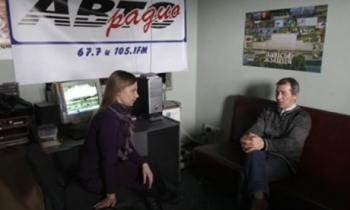NEW YORK: On Sept. 11, 2001, Megan Stack, the Houston bureau chief for the Los Angeles Times, was vacationing in Paris. Following the terrorist attacks that day, she e-mailed her editors to say she was coming home. Their answer surprised her: Stay in Europe -- you'll be more useful there.
In retrospect, it was quite an understatement.
Stack, 30, is now the Cairo bureau chief for the Times. Since 2001, she has traveled to Spain, Bahrain, Pakistan, Afghanistan, Jerusalem, and Iraq. Her coverage of life amid Middle East conflicts garnered her a finalist spot for the 2002 Livingston Awards for young journalists. More recently, her dispatches from Lebanon last summer during the 34-day conflict were filled with vivid and often graphic accounts of how the Israeli bombing campaign impacted civilians and government infrastructure.
One of her July 2006 articles quotes a resident as saying, "This morning, the dogs were eating the neighbors." But she says readers deserve this honest approach: "You can't ignore things just because they are ugly. Ideally, you aim for the medium space in between gratuitous tales of gore and ignoring the horror of war."
Stack was first drawn to the Middle East not only for professional reasons, but for personal ones as well. "I was eager for a change," she says of her time in Texas, "and had dreams of working overseas." After the career-changing experience of Sept. 11, Stack did not need to be persuaded to travel abroad. She soon found herself in eastern Afghanistan, covering the hunt for Osama Bin Laden and the fighting in Tora Bora.
"The Middle East is an incredible story," she tells E&P. "It's where U.S. interests come to a tumultuous head. It's where questions of religion and rule are in constant and often violent rotation. And whether this is intellectually justified or not, it's of more news interest to U.S. readers than any other region in the world right now."
Not only is the region central to United States foreign policy, it is also a hotbed of violence against journalists. Although Stack has had a few scary moments, for the most part she says she has felt safe: "Other than in Iraq, it's important to me to convey how very unthreatened I feel most of the time. I've found that even extreme Salafists are often excited, or at least intrigued, by the opportunity to have their voices heard by an American reporter. They feel they have a message, and they want it conveyed."
Being a woman in fundamentalist countries has been a mixed blessing: "There are stories I can do that men can't," she explains. "I can always speak with the women in conservative cultures, and male reporters absolutely cannot.
"I can blend in much easier than my male counterparts in dangerous areas," she adds. "In Iraq, I've been able to roam around Shiite cities like Najaf and Karbala swathed head to toe in black, and people don't really look at me because it's improper to look women in the face."
Also, Stack has found that in certain situations, being a woman can help her get better quotes from government officials. "I have sometimes suspected that male officials let their guard down a little because somewhere in their minds, they simply don't take women seriously and don't believe a woman journalist can really pose any serious threat," she notes.
But with those benefits come some drawbacks. Stack says she found herself in some awkward situations in Saudi Arabia, where gender segregation is mandated by law and "enforced by religious police." For instance, a meeting with a male Interior Ministry official that was supposed to take place at a coffee shop in Stack's Saudi hotel was instead held surreptitiously on a landing outside a hotel elevator. She also got kicked out of a Starbucks in Riyadh simply for being a woman.
Stack's ease in assimilating herself into these cultures comes across in her stories with the help of translators. She says she is able to operate in Lebanon independently "and do my own reporting, in person, without leaning on local staff to help interview people."
L.A. Times readers learned of the chaotic and deadly toll the Israeli strikes took on Lebanon through the stories of battle-shaken ambulance drivers, the weak and elderly who were left behind to withstand the bombardments, and an asylum that was abandoned by the doctors, leaving 250 patients in the care of a few nurses with limited medication. In each report, Stack utilized the voices of the victims to paint a picture of the events she was witnessing.
Though this may be atypical of the dry, detached reportage that sometimes comes from war zones, Stack sees it as simply the way she writes. "It's not that I think every news story should be dripping with adjectives," she explains. "But I do believe that as a group, newspaper writers need to rethink the way we work. I think too many stories are like chewing cardboard -- no logical sequencing, sentences constructed in awkward ways, the same old clichés and facts stacked on top of each other. Who reads that?"
Stack is emphatic about the value of news reporters conveying what is happening around the world in real time. In the case of Lebanon, this was particularly pertinent. "These stories from Lebanon weren't going into history books," she observes. "They weren't meant for readers who would sigh over the tragedies of the past. They were going to American readers at a time when the U.S. government was reluctant to call for a ceasefire here. So there is a sense that the details are important, that Americans had an urgent need to know about the war and how it was being fought. What does it look like, feel like? What is the human cost of another day, another week of fighting?"
Since the fighting stopped, Stack's duties have shifted. With the threat of aerial bombing gone, traveling across the countryside has become much easier. But she had to switch her outlook as well. "Quieter times, like now, demand a little more nuance in story selection, a deeper analytical grounding, sometimes a more creative approach," she says.
As for future plans, Stack adds that she will continue to use her post as Cairo bureau chief to try to provide more insight into









